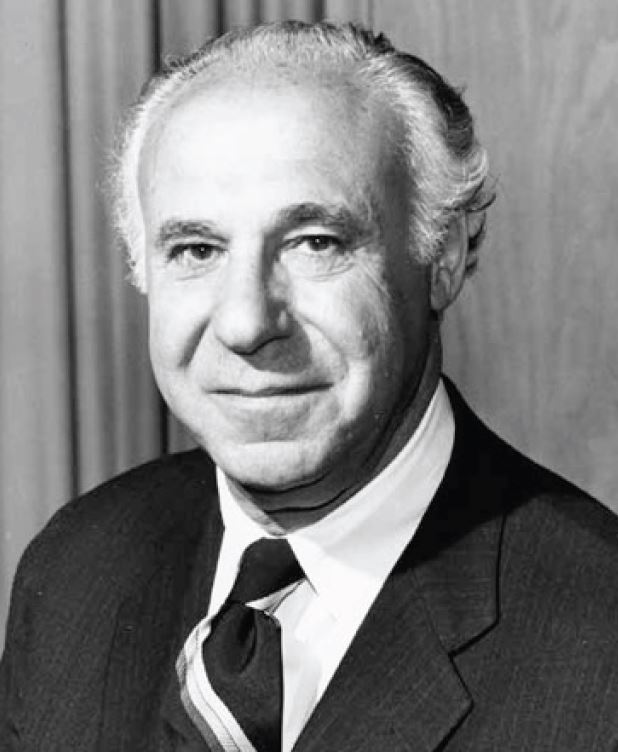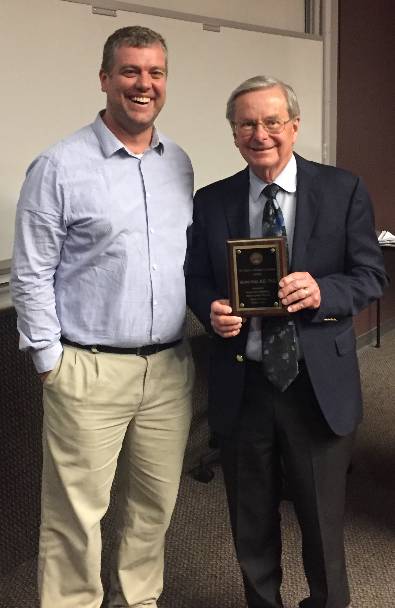- Augusta University
- Colleges & Schools
- Medical College of Georgia
- Physiology
- Robert B. Greenblatt Lectureship
Robert B. Greenblatt Lectureship

The Robert B. Greenblatt Lectureship was established in the spring of 1975 in the Medical College of Georgia Department of Endocrinology. The establishment of this lectureship through the Medical College of Georgia Foundation, Inc., enables the department to bring outstanding and distinguished leaders in endocrinology or related fields to the Augusta campus. Visiting lecturers will have an opportunity to exchange work and ideas with local researchers. It also is anticipated that the lecture series will inspire young investigators and students and will be a long-lasting tribute to Dr. Greenblatt.
Learn more about Dr. Greenblatt's career
Dr. Robert Benjamin Greenblatt, was born in 1906 in Montreal, Canada. Dr. Greenblatt attended McGill University in Montreal, where he received his BA degree in 1928 and his MD and Master of Surgery degrees in 1932, specializing in gynecology and endocrinology. In 1935, after completing his internship, he joined the Medical College of Georgia (MCG) as a research fellow in pathology and resident in obstetrics and gynecology. In 1937, he was appointed an assistant professor of pathology and gynecology, and two years later, he was named a professor of experimental medicine. In his early years at the MCG Dr. Greenblatt worked with Edgar Pund on the pathology and therapy of granuloma inguinale, a widely endemic venereal disease. In 1943 he volunteered for military service and served as a Commander and Senior Medical Officer in the U.S. Coast Guard. His first assignment was to quell a venereal disease epidemic spreading among sailors in Savannah, GA. He helped develop mass production of penicillin for battlefield use; commanded a triage unit on the Okinawa beachhead for wounded Marines; and was among the first scientists to inspect the medical effects of the atomic bomb in Nagasaki. Commander Greenblatt was honorably discharged in 1945. Dr. Greenblatt returned to the MCG after World War II and from 1946 to 1974 he served as a professor and chairman of the Department of Endocrinology, the first academic department of its kind in the country. He taught, practiced and researched at the MCG until 1974, making him one of the university’s longest-serving faculty members. He retired in 1974, remaining in the department as Professor Emeritus until his death in 1987. The following year, MCG renamed the library in his honor.
Dr. Greenblatt started his clinical work in reproductive endocrinology, when the field was in its infancy. His major advances in the field include, in 1950, showing the effectiveness of estrogens in managing menopause symptoms and developing, in 1966, a monthly oral contraceptive pill, an accomplishment for which the MCG received national attention. His group's discovery in 1961 that clomiphene citrate could induce ovulation was a breakthrough in reproductive biology, and clomiphene citrate is today the first choice in treating ovulatory disorders. He also showed that the drug Danazol was useful in the management of endometriosis and fibrocystic breast disease. Dr. Greenblatt maintained a private practice in Augusta until his death, admitting patients from across the United States, as well as several foreign countries. He frequently was invited to lecture abroad. He wrote approximately 600 scientific articles and 95 chapters for medical texts. He was the author or editor of 25 books. His book, Search the Scriptures, has been reprinted 21 times and Love Lives of the Famous is now in its fourth printing. His last book, Sex and Circumstance: Humanity in History with 44 vignettes detailing the sexual nature of people ranging from U.S. President John F. Kennedy to Pyotr Ilyich Tchaikovsky was published in 1987.
Truly a scholar, teacher and “homme extraordinaire,” Dr. Greenblatt received the Crawford W. Long Memorial Medal, the Cadaver Award for Teaching Excellence at the MCG and the Phi Lambda Kappa Gold Medal for outstanding contributions of Medical Science. In addition, he received the Billings Silver Medal of the American Medical Association and the Barren Gold Medal for his work in reproductive physiology, the Edward Henderson Gold Medal of the American Geriatrics Society and the 1983 International Alpha Omega Dental Fraternity Achievement Medal. Dr. Greenblatt was awarded the Honoris Causa from the Universite de Bordeaux, France, in 1970 and Institut Robert Greenblatt for Reproductive Medicine in Bordeaux, France was named in his honor. Dr. Greenblatt was nominated to the rank of Chevalier of the Legion of Honor by the President of France.
He was a diplomate of the American Board of Obstetrics and Gynecology, served as an editorial board member for several journals, including Family Physician, Current Medical Dialog, Geriatrics, Medical Aspects of Human Sexuality, OB-GYN Digest, Gynecologie (Paris, France) and was editorial consultant of the Medcom Faculty of Medicine. He was a member of 16 gynecological societies in the United States and 10 societies in foreign countries, an honorary Fellow of the International College of Surgeons, the American Academy of Family Physicians and a Fellow of the New York Academy of Science and the Royal Society of Arts. He was an associate member of the Royal Society Medicine. Dr. Greenblatt served as a President of the American Geriatrics Society, American Physicians Fellowship and International Family Planning Research Association. He was Vice President of Southern Obstetrics and Gynecology Seminars, honorary Vice President of the American Fertility Society (1978) and honorary President of the French Gynecology Society (1979). In 1985, Dr. Greenblatt was President of the International Menopause Society. He was honorary President of the Fifth International Congress of the Menopause in Sorrento, Italy in April 1987 and presided at the 11th World Congress of OB/GYN in West Berlin, Germany. Dr. Greenblatt was elected an honorary Fellow to the Royal College of Obstetricians and Gynecologists in June 1987 in London, England. In 1987, Dr. Greenblatt was cited by Fertility and Sterility as a co-author of three of the most-cited articles published in that journal in its 38-year history.
Past Lecturers:

2023- Samir Parikh, MD, University of Texas Southwestern Medical School
2022- Benjamin D. Humprheys, MD, PhD, Washington University School of Medicine
2021 - Martin Schwartz, PhD, Yale University
2019- Karen Reue, PhD, University of California
2017 - Murray Esler, MD, PhD, Baker Heart IDI Melbourne Australia
2015 - Alan K. Johnson, PhD, University of Iowa
2012 - Louis J. Guillette Jr., PhD, Medical University of South Carolina
2010 - Sandra T. Davidge, PhD, University of Alberta Edmonton
2008 - C. Ronald Kahn, MD, Joslin Diabetes Center, Harvard Medical School
2000 - Erwin Neher, PhD, Max-Planck-Institute for Biophysical Chemistry
1998 - John Cidlowski, PhD, National Institute of Environmental Sciences
1997 - Eugene D. Albrecht, PhD, University of Maryland
1996 - Elwood V. Jensen, PhD, University of Hamburg
1995 - Sergio R. Ojeda, DVM, Oregon Health Sciences University
1994 - Donald W. Pfaff, PhD, Rockefeller University
1993 - Gerald J. Pepe, PhD, Eastern Virginia Medical School
1991 - David O. Toft, PhD, Mayo Medical School
1990 - J. David Puett, PhD, University of Miami
1988 - Edward E. Wallach, MD, The Johns Hopkins Medical Institutions
1987 - Richard J. Blandau, MD, PhD, Washington School of Medicine
1985 - Kenneth J. Ryan, MD, Harvard Medical School
1984 - Bert O’Malley, MD, Baylor University
1983 - Roger Guilleman, MD, PhD, Salk Institute
1981 - Andrew V. Schally, PhD, Tulane University School of Medicine
1980 - Bruno Lunenfeld, MD, the State of Israel’s Chaim Sheba Medical Center
1978 - Sheldon J. Segal, PhD, the Rockefeller Foundation
1977 - Egon Diczfalusy, MD, PhD, Swedish Medical Research Council
1976 - Samuel McDonald McCann, MD, University of Texas, Southwestern Medical School
1975 - Luciano Martini, MD, University of Milan